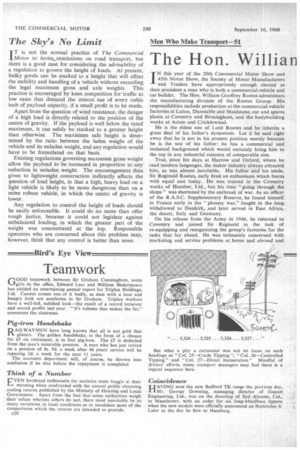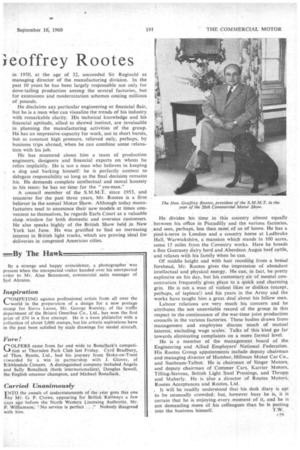Men Who Make Transport-51
Page 74

Page 75

If you've noticed an error in this article please click here to report it so we can fix it.
The Hon. Willian ieoffrey Rootes
IN this year of the 20th Commercial Motor Show and 45th Motor Show, the Society of Motor Manufacturers and Traders have appropriately enough elected as their president a man who is both a commercial-vehicle and car builder. The Hon. William Geoffrey Rootes administers the manufacturing division of the Rootes Group. His responsibilities include production at the commercial-vehicle factories at Luton, Dunstable and Maidstone, car and spares plants at Coventry and Birmingham, and the bodybuilding works at Acton and Cricklevvood. .
He is the eldest son of Lord Rootes and he inherits a great deal of his father's dynamism. Let it be said right away that he is not in his present position merely because he is the son of his father: he has a commercial and technical background which would certainly bring him to the top in any industrial concern of comparable size.
True, since his days at Harrow and Oxford, where he read modern languages, the motor industry always attracted him, as was almost inevitable. His father and his uncle, Sir Reginald Rootes, early fired an enthusiasm which burns with equal zest today. He was trained in the Coventry works of Humber, Ltd., but his time "going through the shops" was shortened by the outbreak of war. As an officer of the R.A.S.C. Supplementary Reserve, he found himself in France early in the "phoney war," fought in the long withdrawal to Dunkirk, and later served in East Africa, the desert, Italy and Germany.
On his release from the •Army in 1946, he returned to Coventry and joined Sir Reginald in the task of re-equipping and reorganizing the group's factories for the tasks that lay ahead. He was intimately concerned with marketing and service problems at home and abroad and in 1950, at the age of 32, succeeded Sir Reginald as managing director of the manufacturing division. In the past 10 years he has been largely responsible not only for dove-tailing production among the several factories, but for extensions and modernization schemes costing millions of pounds.
He disclaims any particular engineering or financial flair, but he is a man who can visualize the trends of his industry with remarkable clarity. His technical knowledge and his financial aptitude, allied to shrewd instinct, are invaluable in planning the manufacturing activities of the group. He has an impressive capacity for work, not in short bursts, but at constant high pressure, relieved only, perhaps, by business trips abroad, when he can combine some relaxation with his job.
He has mustered about him a team of production engineers, designers and financial experts on whom be relies implicitly. He is not a man who believes in keeping a dog and barking himself: he is perfectly content to delegate responsibility so long as the final decision remains his. He demands complete intellectual and moral honesty in his team: he has no time for the "yes-man."
A council member of the S.M.M.T. since 1953, and treasurer for the past three years, Mr. Rootes is a firm believer in the annual Motor Show. Although today manufacturers tend to announce their new models at times convenient to. themselves, he regards Earls Court as a valuable shop window for both domestic and overseas customers. He also speaks highly of the British Show held in New York last June. He was gratified to• find an increasing interest in British light trucks, which are proving ideal for deliveries in congested American cities. He divides his time in this country almost equally between his office in Piccadilly and the various factories, and sees, perhaps, less than most of us of home. He has a pied-a-terre in London and a country home at Ladbroke Hall, Warwickshire, a mansion which stands in 100 acres, some 15 miles from the Coventry works. Here he breeds a fine Guernsey dairy herd and Aberdeen Angus beef cattle, and relaxes with his family when he can.
Of middle height and with hair receding from a broad forehead, Mr. Rootes gives the impression of abundant intellectual and physical energy. He can, in fact, be pretty explosive on his day, but his customary air of mental concentration frequently gives place to a quick and charming grin. He is not a man of violent likes or dislikes (except,• perhaps, of tapioca!) and his years in the Army and the works have taught him a great deal about his fellow men.
Labour relations are very much his concern and he attributes the not unenviable record of the group in this respect to the continuance of the war-time joint production councils in the various factories. These bodies drawn from management and employees discuss much of mutual interest, excluding wage scales. Talks of this kind go far towards eliminating complaints on a more formal level.
He is a member of the management board of the Engineering and Allied Employers' National Federation. His Routes Group appointments include deputy chairman and managing director of Humber, Hillman Motor Car Co., and Sunbeam-Talbot. He is chairman of Singer Motors, and deputy chairman of Commer. Cars, Karrier Motors, Tilling-Stevens, British Light Steel Pressings, and Thrupp and Maberly. He is also a director of Rootes Motors, Rootes Acceptances and Rootes, Ltd.
, It will be readily understood that his desk diary is apt to be unusually crowded: but, however busy he is, it is certain that he is enjoying-every -moment of it, and he is not demanding more of his colleagues than he is putting into the business himself. T.W.




































































































































































































































